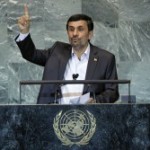Iran has conducted war games near a critical oil shipping lane. The United States has upped its rhetoric about “all options” being “on the table.” A nuclear scientist is assassinated in Iran. Sanctions talk against Iran is rising in Europe. And all this is happening as the Syrian regime’s brutality is raising questions if anything can stop the bloodshed. Yes, the Middle East is closer to a boiling point now than it has been for years—is another war on the way?
Perhaps the most intriguing indication that the tensions are reaching an uncomfortable point is that the US is intentionally calming things down. Ynet reported that an upcoming military drill with Israel has been postponed in part so as not to further exacerbate tensions with Iran.
And yet, in light of that effort, one has to wonder what little could set the region ablaze. What if Iran miscalculates and provokes the Americans too much? What if Hezbollah pulls off a terror attack against an Israeli target abroad?
Or perhaps one should ask the question another way: If the Americans were willing to let tensions heat up this much for now, what is the next step? Will they simply let the heat rise a little further—or will they light the match and strike the Iranian nuclear program?
Essentially, the main point at stake is the progress in Iran’s nuclear program. An increasingly bold undercover operation targeting facilities and officials related to the nuclear or missile efforts has already implied that Tehran is nearing the point where the West will have to launch an official military response to stop them.
And yet the US apparently does not think that timing is now. They must, however, not wait until it’s too late.
That same fear is in play in Syria. President Bashar al-Assad actually continued his violence against protestors during the Arab League monitor mission. The West has already applied sanctions, and the Arabs approved their own.
As US Ambassador to the United Nations Susan Rice argued last week, the next logical step is a strong UN condemnation of Assad’s brutality. Yet will Russia turn on their quasi-ally in Damascus and let such a UN move happen? They already vetoed it once.
So what will the West do if Russia doesn’t budge? Will they arm the rebels? Will they aid them? Will Turkey set up “safe zones” in eastern Syria where refugees can flee—at the risk of a regional war?
Like the situation in Iran, it is clear that no one is prepared to take such drastic steps—at least not openly—at this point. But when does that line get crossed? How far is too far?
It’s clear that the West is in need of prime intel, of wise decision-makers and perfect timing. It’s also clear that while the thought of an unnecessary conflict should send shudders through officials in Europe and the US, there’s one fear that should be even greater: Finding the blood of thousands on their hands because they did not act in time.
(By Joshua Spurlock, www.themideastupdate.com, January 15, 2012)

